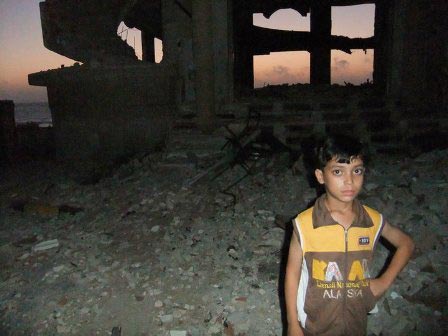
The International Crisis Group (ICG) issued a warning that the recent escalation of air strikes on Gaza and rocket attacks into Israel has created “the conditions for a rapid deterioration toward the kind of clash to which neither side aspires, for which both [Israel and Hamas] have carefully prepared, and from which they will not retreat quickly.”
In June of last year, I had a glimpse of the destruction wrought during Israel's 'Cast Lead' military offensive on the Gaza Strip and Palestinian militants' barrages of rocket fire into Israel. Even back then I met Israelis and Palestinians who were gravely concerned about a renewal of catastrophic hostilities. As the ICG report illustrates, the “combustible context” of the present circumstances necessitates 1) an immediate and comprehensive ceasefire between Israel and Hamas 2) an end to the closure regime on Gaza which constitutes an “assault on normal, dignified life” and 3) Palestinian reconciliation efforts should be supported, which will “require a different approach by international actors, Western countries in particular” to Hamas.
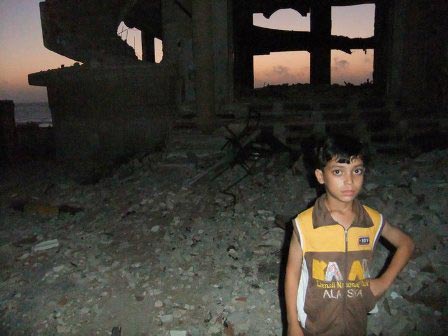
Stage set for Operation Cast Lead II?
Israeli Prime Minister Benjamin Netanyahu threatened that if the rocket attacks continue—and Islamic Jihad has promised they will—“there will be an even more painful military retaliation.” While the assailants of the bus bombing in Jerusalem—which killed one passenger and wounded dozens—are still unknown, the attack added fuel to a fire already stoked by several months of airstrikes and rocket attacks. Tensions in the West Bank have also been extremely volatile in the wake of the murders of five family members in the Israeli settlement of Itamar. According to a UN report, “in the days before the killings in Itamar, there was already a sharp increase in the number of settler incidents” and the number of settler attacks on Palestinians continued to rise in its aftermath.
Israel’s Deputy Minister Silvan Shalom has ominously warned that “the period of restraint is over” adding that “I hope it won’t come to another Operation Cast Lead, but if there is no other choice, we will launch another operation.” Operation Cast Lead was the 22-day Israeli military assault on the Gaza Strip more than two years ago which killed approximately 1,400 Palestinians, a majority of whom were civilians, and wounded 5,300 more. Thirteen Israelis were killed during the hostilities, including three civilians struck by rocket attacks in Israel, and nearly 800 were wounded.
Israel’s air strikes have already killed 14 Palestinians since March 19th, including 5 children, and injured dozens. Rocket attacks have injured a number of Israelis and have reached, for the first time, the outskirts of Tel Aviv. On Tuesday, March 29th, eye-witnesses in Gaza reported seeing Israeli tanks accompany bulldozers that leveled more agricultural land in the Strip.
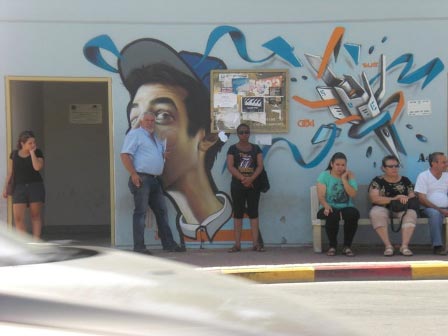
The On-going “Assault on a Normal, Dignified Existence”
The ICG points out that the ceasefire must be accompanied by ending “an access regime that is best defined as neither a siege nor blockade, but rather as an assault on a normal dignified existence, and an engine of impoverishment, social isolation, and political disaffection”.
Israel continues to bar Palestinians in Gaza from accessing the construction materials they need to rebuild the war-ravaged Strip. During my visit to Gaza, I saw large areas of the Strip that still looked like a vast moonscape of mounds and craters of rubble, where Israeli air strikes had leveled entire neighborhoods to the ground. Just a few days before my visit, the International Committee of the Red Cross called the closure regime on Gaza “collective punishment imposed in clear violation of Israel’s obligations under international humanitarian law”, noting that “the whole of Gaza’s civilian population is punished for acts for which they bear no responsibility”.
I saw neighborhoods teeming with thousands of makeshift tents, pieced together with tarps and scrap metal, where survivors of Cast Lead lived. These families slept on the rubble of what was once their home before Israeli airstrikes or bulldozers demolished it wholesale. Many Palestinians told me that during Cast Lead, they had taken shelter in schools. With 46% of the schools damaged or destroyed during those three weeks and with Israel’s continuous denial of UN requests to import construction materials to build new schools, it is unclear where civilians could go for any modicum of protection against a full-scale Israeli military offensive.
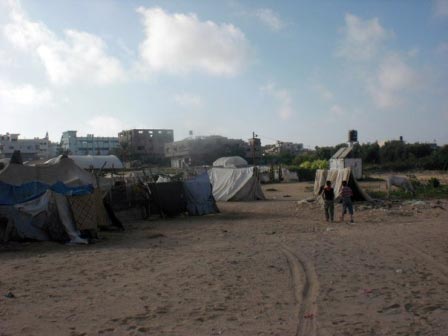
Ceasefire Requirements for Hamas
ICG highlights that in any ceasefire agreement Hamas must be committed not only to ending its own rocket and mortar attacks but that Hamas “should continue to enforce the ceasefire on recalcitrant groups”, like the Salafi-Jihadist militants routinely firing rockets into Israel.
On two separate occasions last year I visited Sderot, the Israeli town that bore the brunt of rocket attacks during Cast Lead. I was struck by how the character of the entire town is shaped by these rocket attacks. The bus stops have been transformed to double as rocket shelters, rocket shields have been installed on the roofs of school buildings, and even the playground structures are fortified shelter in the 15 seconds they have between the sounding of the ‘Color Red’ rocket warning siren and when the rocket will land. I met an Israeli named Nomika Zion, who vividly described what it was like to live in Sderot during Cast Lead. She recounted times when the ‘Code Red’ siren would sound 60 times in a single day, while at night her walls would shudder from the Israeli bombardment of Gaza, less than a mile away.
“Israel should refrain from targeting farmers and those collecting rubble”
The ICG points out that “Israel should refrain from targeting farmers and those collecting rubble in the buffer zones that the Israeli army enforces on the Strip’s perimeter”. Remote-controlled Israeli machine guns fire at Palestinians whom Israeli security forces determine to be too close to the Gaza/Israel border. Since Cast Lead, dozens of Palestinians, including children, have been killed and many more have been wounded by Israeli fire while collecting rubble and scrap metal or tending to their farms in these buffer zones.
Seeing some of these rubble and scrap metal collectors at work was the first image I saw upon entering the Gaza Strip. I peered through the openings in Israel’s caged walkway from Erez crossing to see Palestinian boys piling rubble onto donkey-drawn carts in what looked like the aftermath of an earthquake. Later, I learned that they were collecting scrap metal and rubble to sell for production of recycled cement. While notorious for its poor quality and suspected contamination with depleted uranium, recycled cement is still in high demand due to Israel’s ban on construction materials. On my bus ride from Gaza City to its southern border in Rafah, I saw boys collecting rubble or processing rubble collections in at least a dozen different neighborhoods. Gaza has one of the world's highest rates of unemployment and locals told me that bomb-site scavenging, dangerous though it was, was the only work these boys and young men could find.
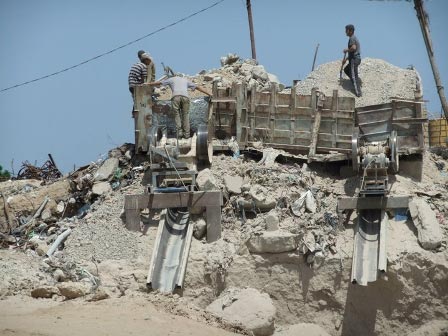
International Community Must Support Palestinian Unity
Finally, ICG notes the imperative for Palestinian unity between the rival factions of Hamas and Fatah. The report emphasizes that Western countries “should pledge to work with any government that adheres to a ceasefire”, rather than boycott a unity government which would, in meaningful reconciliation effort, include Hamas.
Netanyahu has already rejected the negotiation of a peace agreement with any Palestinian unity government that includes Hamas, even though the only way to ensure a ceasefire could be effective and fully protect Israeli civilians would be to gain Hamas’s buy-in.
For the Good of All Civilians: Ceasefire, Normalization of Life in Gaza, and Hamas Engagement
The greatest protection for civilians would clearly be an effective ceasefire rather than a renewal of violence as witnessed in Cast Lead—which saw the deadliest 24 hours for Palestinians since 1948 and the greatest number of rocket attacks in Israeli history. The ICG points out that rather than protecting civilians, the primary intentions of Israel and Hamas are to ‘deliver messages’ of deterrence:
“Hamas is seeking to deliver a message to Israel that it will not be intimidated and that it too can control the timing, pace, and scope of the confrontation. The same is true for Israel, intent on demonstrating its continued deterrent power.”
The ICG report should serve as a wake-up call that the “assault on normal, dignified life” for Palestinians in Gaza and the U.S. and Israeli isolation of Hamas endanger, rather than protect, civilian lives on both sides of the Israeli-Gaza border.
Matching Opportunity Extended: Please support Truthout today!
Our end-of-year fundraiser is over, but our donation matching opportunity has been extended! Today, all donations to Truthout will be matched dollar for dollar. Your one-time gift today will be matched immediately. As well, your monthly donation will be matched for the whole first year, doubling your impact.
This matching gift comes at a critical time. Trump has made it no secret that he is planning a demolition-style attack on both specific communities and democracy as a whole, beginning on his first day in office.
Help us prepare for Trump’s Day One, and have your donation matched today!